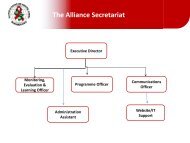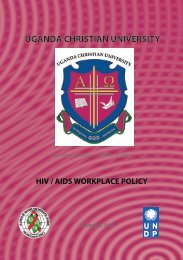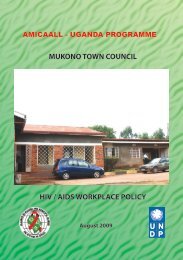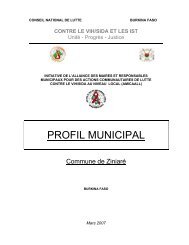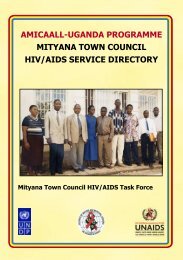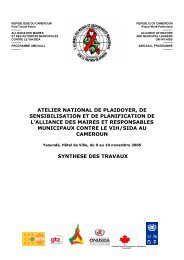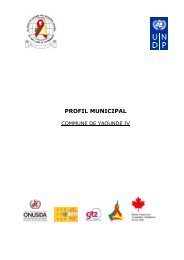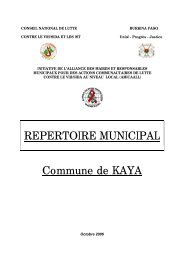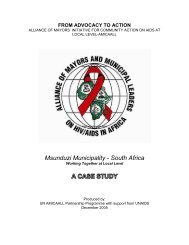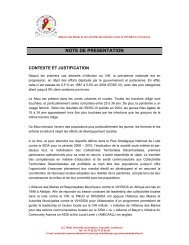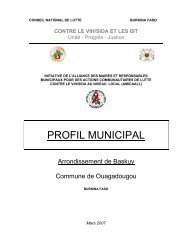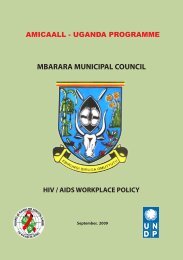KASESE TOWN COUNCIL HIV/AIDS WORKPLACE POLICY - amicaall
KASESE TOWN COUNCIL HIV/AIDS WORKPLACE POLICY - amicaall
KASESE TOWN COUNCIL HIV/AIDS WORKPLACE POLICY - amicaall
- No tags were found...
Create successful ePaper yourself
Turn your PDF publications into a flip-book with our unique Google optimized e-Paper software.
AMICAALL-UGANDA PROGRAMME<br />
THE REPUBLIC OF UGANDA<br />
<strong>KASESE</strong> <strong>TOWN</strong> <strong>COUNCIL</strong><br />
<strong>HIV</strong>/<strong>AIDS</strong> <strong>WORKPLACE</strong> <strong>POLICY</strong>
FOREWORD<br />
In this current wave of the <strong>HIV</strong>/<strong>AIDS</strong> epidemic, a workplace Policy is important to all organizations.<br />
This is in response to the challenges of the <strong>HIV</strong>/<strong>AIDS</strong> pandemic within urban<br />
workplaces and communities. Discrimination, stigmatization and lack of awareness call for<br />
the need to mainstream <strong>HIV</strong>/<strong>AIDS</strong> in the workplaces.<br />
Kasese Town Council recognizes the need for formulating an <strong>HIV</strong>/<strong>AIDS</strong> Workplace Policy.<br />
A lot of work and sensitization about <strong>HIV</strong>/<strong>AIDS</strong> is currently being undertaken by the Council.<br />
The Council however, lacks a Workplace Policy to enable it handle this function in a<br />
consistent and more effective manner. It is against this background that the Council is<br />
developing this Policy so that it can mainstream <strong>HIV</strong>/<strong>AIDS</strong> activities in the urban Council.<br />
This policy will therefore serve as a guide to address workplace <strong>HIV</strong>/<strong>AIDS</strong> challenges in<br />
Kasese Town Council and other associated Institutions.<br />
Lastly, the production of this policy is just a step in the beginning of a long journey, a journey<br />
of reducing the threat of <strong>HIV</strong> and impact of <strong>AIDS</strong> at the workplace and Kasese Town<br />
Council community at large. While I use this opportunity to thank all stakeholders and our<br />
staff and my councilors for making this policy possible, the bigger challenge lies before us.<br />
This policy must not be shelved, it is upon all of us to implement it and for those organizations<br />
and enterprises within KTC to emulate this example and come up with similar policies<br />
for their workplaces. Together we will succeed.<br />
Byaruhanga Cosmas<br />
Chairperson LCIII/Mayor<br />
<strong>KASESE</strong> <strong>TOWN</strong> <strong>COUNCIL</strong><br />
ii
ACKNOWLEDGEMENT<br />
Kasese Town Council would like to thank all organizations and individuals that made the<br />
development of this Policy possible. We acknowledge the efforts of technical staff and<br />
councilors, <strong>AIDS</strong> taskforce without whom this policy wouldn’t come to its fulfillment.<br />
Special thanks go to UNDP and AMICAAL Uganda Program for providing the necessary<br />
guidance and financial assistance to support the publication of this policy. We greatly acknowledge<br />
the contribution of AMICAAL in scaling up <strong>HIV</strong>/<strong>AIDS</strong> response in workplaces<br />
Mukobi Seleverio<br />
Ag. Town Clerk<br />
<strong>KASESE</strong> <strong>TOWN</strong> <strong>COUNCIL</strong><br />
iii
Table of Contents<br />
FOREWRD:...................................................................................................... ii<br />
ACKNOWLEDGEMENTS:................................................................................... iii<br />
ACRONYMS: .................................................................................................... v<br />
INTRODUCTION:............................................................................................ 1<br />
BACKGROUND:............................................................................................... 1<br />
OBJECTIVES:.................................................................................................. 3<br />
METHODOLOGY.:.............................................................................................4<br />
IMPLEMENTION STRATEGY:..............................................................................7<br />
iv
Acronyms<br />
<strong>AIDS</strong><br />
AMICAALL<br />
ARV<br />
<strong>HIV</strong><br />
ILO<br />
KTC<br />
PHAs<br />
UNDP<br />
VCT<br />
WPP<br />
Acquired Immune Deficiency Syndrome<br />
Alliance of Mayor’s Initiative for Community Action on <strong>AIDS</strong> at the<br />
Local Level<br />
Anti- Retroviral<br />
Human Immuno Deficiency Virus<br />
International Labour Organization<br />
Kasese Town Council<br />
People living with <strong>HIV</strong>/<strong>AIDS</strong><br />
United Nations Development Programme<br />
Voluntary Counseling and Testing<br />
Workplace Policy
PART I<br />
1.1 Introduction<br />
Kasese Town Council is located in Western Uganda 420km from Kampala the Capital<br />
City of Uganda. The Town is the headquarters of Kasese District Local Government and<br />
a center of commercial and industrial activities with education, social, transport and<br />
communication infrastructure. The Town started in the 1940’s as a Labour camp for<br />
the Railway and Nyakatonzi Ginnery workers. It was declared a Town board in 1959<br />
and a Town Council in 1974 together with the creation of Kasese district.<br />
Preliminary results of September 2002 census indicate that KTC has a total population<br />
of 55,167 people with 27,537 (49.9%) Males and 27,630 (50.1%) Females. This population<br />
is three fold from the 18,570 in 1991 indicating. The Town is the 7 th populated<br />
in Uganda.<br />
Factors associated with urbanization and the growth of Kasese Town Council include;<br />
• Central location in the District with a rich agricultural and mineral hinterland.<br />
• Copper and cobalt mining from Kilembe, Salt extraction from L. Katwe, Limestone<br />
for Cement from Hima.<br />
• Tourism attraction potentials such as the Rwenzori Mountains, and the Queen<br />
Elizabeth protected areas.<br />
• Good transport and communication net work where it is linked to the capital city<br />
by road, Air and a railway line.<br />
VISION:<br />
A well planned, clean, green and poverty free Municipality by the Year2025.<br />
MISSION:<br />
To deliver efficient and effective services to the Town Community for sustainable,<br />
social and economic development.<br />
1.2 Background:<br />
<strong>HIV</strong>/<strong>AIDS</strong> research globally and nationally indicate that, <strong>HIV</strong>/<strong>AIDS</strong> affects adults most<br />
often at the peak of their productive working years. In the year 2002, the ILO estimated<br />
that 25 million working people were infected with <strong>HIV</strong>/<strong>AIDS</strong>; constituting over<br />
60% of the overall global <strong>HIV</strong> infection. This proved the notion that <strong>HIV</strong>/<strong>AIDS</strong> is a<br />
real threat to livelihoods, and to basic rights at work, thus undermining guaranteed<br />
productivity of both women and men.
1.3 <strong>HIV</strong>/<strong>AIDS</strong> Situation in Kasese.<br />
Although there are no figures for Kasese Town Council <strong>HIV</strong> prevalence, available figures<br />
for the whole district indicate that the estimated <strong>HIV</strong> prevalence rate for Kasese<br />
district is 16% (DHO Kasese, June 2007). Like any other urban centre Kasese Town<br />
council has been badly hit by the scourge. Factors associated with the high <strong>HIV</strong> prevalence<br />
include among others; its close location to the busy boarder with the Democratic<br />
Republic of Congo, Insecurity that rocked the district between 1988 and 2000 leaving<br />
many internally displaced people and high rate of rural-urban migration in search for<br />
jobs all leading to increased vulnerability of the local urban community to <strong>HIV</strong> infection<br />
The impact of the urban community has been very devastating resulting into; increased<br />
ill health causing strain on the available health services and reduced labour force, high<br />
rate of orphanhood and increased number of street children. The prolonged epidemic<br />
has resulted in reduced family income leading to increased poverty at the household<br />
level which has often resulted into disputes and breakdown of family structure.<br />
The fight against <strong>HIV</strong>/<strong>AIDS</strong> in Kasese Town Council has been participatory involving<br />
the entire local community. Key stakeholders include; Faith based Organizations, Non<br />
Governmental Organizations, Political leaders, People living with <strong>HIV</strong>/<strong>AIDS</strong> and Development<br />
Partners. Current interventions include among others; general awareness<br />
raising and sensitization, psychosocial support services, advocacy for women living<br />
with <strong>HIV</strong>/<strong>AIDS</strong>, <strong>HIV</strong> testing and counseling, Gender and <strong>HIV</strong>/<strong>AIDS</strong> and Youth peer<br />
education. However, current interventions have been well coordinated and have not<br />
addressed <strong>HIV</strong>/<strong>AIDS</strong> at the Workplace.<br />
In order to enhance current <strong>HIV</strong>/<strong>AIDS</strong> interventions and in attempt to bridge the existing<br />
gaps, Kasese Town Council has developed a Workplace Policy on <strong>HIV</strong>/<strong>AIDS</strong> to<br />
address major workplace <strong>HIV</strong>/<strong>AIDS</strong> challenges and other associated institutions.
2.1 Goal:<br />
PART II<br />
To create a conducive and enabling environment free from discrimination and stigma<br />
for workers who are infected or affected by <strong>HIV</strong>/<strong>AIDS</strong> in Kasese Town Council.<br />
2.2 Overall objective:<br />
To provide a set of institutional guidelines to address major workplace <strong>HIV</strong>/<strong>AIDS</strong> challenges<br />
in Kasese Town Council.<br />
2.2.1 Specific Objectives:<br />
a) Prevent further <strong>HIV</strong> infection through preventive programs including community<br />
mobilization, awareness raising, training and counseling.<br />
b) Ensure availability of treatment, care and support to all Kasese Town Council<br />
staff, Councilors and their families without any discrimination.<br />
c) Mitigate the impact of the epidemic among the workers through the provision<br />
of psychosocial support and empowerment of the affected workers and their<br />
families.<br />
d) Support other workplaces (Formal and Informal) in Kasese Town Council to develop<br />
Workplace Policies and Programmes.<br />
2.3 Target group:<br />
The policy will target the urban authority, associated institutions and the local urban<br />
community at large. The primary target is the staff, councilors and their families while<br />
the secondary target will include other workplaces and the local urban community.<br />
2.4 Justification:<br />
<strong>HIV</strong>/<strong>AIDS</strong> is a major workplace issue, which Kasese Town Council cannot ignore. The<br />
wide spread effect of the disease on communities across the country means that it is<br />
having a major impact on the socioeconomic activities in Uganda and Kasese in particular,<br />
which has over the past years experienced increased ill health due to <strong>HIV</strong>/<strong>AIDS</strong><br />
resulting in strain on the available services and reduced labour force.<br />
Kasese Town Council being cosmopolitan in nature with distinct social problems leaves<br />
the people living in the urban community with higher vulnerability to the risks of acquiring<br />
<strong>HIV</strong>/<strong>AIDS</strong>. It is anticipated that the Policy will create an enabling environment<br />
free of discrimination and stigmatization hence create a happy and enjoyable relationship<br />
between workers of Kasese Town Council leading to increased productivity.
2.5 Methodology:<br />
The Policy development process was participatory and inclusive, involving all key<br />
stakeholders in Kasese Town Council and the district at large. Accordingly, consultative<br />
meetings were held with the District Labour office, the Technical Planning committee,<br />
Town Council <strong>AIDS</strong> Task Force. In addition, other key partners involved in <strong>HIV</strong>/<strong>AIDS</strong><br />
response at the National and district level were consulted to solicit for their input in<br />
the development process.<br />
The ILO CODE of Practice on <strong>HIV</strong>/<strong>AIDS</strong> and the World of Work together with AMI-<br />
CAALL Guide for Managing <strong>HIV</strong>/<strong>AIDS</strong> in Urban Workplaces were used as key reference<br />
documents to inform the policy development process. Key principles outlined in the<br />
Policy document are in line with ILO CODE of Practice on <strong>HIV</strong>/<strong>AIDS</strong> and the World of<br />
Work.<br />
Kasese Town council technical staff in consultation with the <strong>AIDS</strong> Task Force, the<br />
Technical Planning committee formulated a Draft Workplace Policy based on the local<br />
needs and conditions as a basis for more extensive consultations and discussions<br />
in the Policy development process. In order to enhance broader participation of key<br />
stakeholders in Kasese Town Council and solicit for their input in the Policy development<br />
process, a Workshop was organized by AMICAALL with support from UNDP to<br />
review the Draft Policy. Participants in the review Workshop included Local Councilors,<br />
KTC staff, Private Sector representatives, CSOs and Faith Based Organizations working<br />
in Kasese Town Council. The Workshop provided an opportunity for the revision of the<br />
Draft Policy based on the comments and proposals made by the key stakeholders.<br />
The method used was the most appropriate to realize broader participation of all Key<br />
Stakeholders in the development process and ensure clear understanding of the Policy<br />
by all stakeholders hence generate a sense of ownership and support which is critical<br />
for implementation the Policy.<br />
2.6 Key Principles of the Policy<br />
The Key Principles of the policy have been formulated based on the ILO code of practice<br />
on <strong>HIV</strong>/<strong>AIDS</strong> and the world of work. Accordingly, Implementation of this policy<br />
shall adhere to these Key Principles<br />
2.6.1 Anti Discrimination and Equal Treatment<br />
Anti discrimination leads to stigmatization which undermines care and support of those<br />
infected and affected and in turn hinders prevention efforts. Therefore;<br />
• Anti-discrimination campaigns and measures will be promoted through awareness<br />
raising on equal treatment and employees rights<br />
• Equal employment opportunities shall be granted to all regardless of ones <strong>HIV</strong><br />
Status<br />
• <strong>HIV</strong> status will not be a basis for promotion or other work opportunities such as<br />
transfers travel, training, unless there are clear grounds for doing so.<br />
• <strong>HIV</strong>/<strong>AIDS</strong> status should not be cause of termination in employment<br />
• Discrimination or other forms of harassment on ground of <strong>HIV</strong> status shall be<br />
treated as a disciplinary matter
2.6.2 Confidentiality and Privacy<br />
Although knowledge of a staff’s status would facilitate resource planning, all staff will<br />
have a right to confidentiality on their medical information. Therefore;<br />
• A staff member’s <strong>HIV</strong> status shall always be treated as confidential; Individual<br />
<strong>HIV</strong>/<strong>AIDS</strong> cases will be handled in a discreet and private manner.<br />
• With the principle of openness and trust, staff will be encouraged to be open<br />
about their status. However Access to benefits should not be pegged to declaration<br />
of one’s status. A staff willing to declare his/her status can do so to his or<br />
her Supervisor, Personnel Officer or any other person of his/her choice.<br />
• An individual who divulges information about the <strong>HIV</strong> status of a staff member,<br />
without that member’s consent, shall be subject to disciplinary action. The relevant<br />
part of the disciplinary procedures under the existing personnel policy of<br />
Kasese Town Council should be amended accordingly.<br />
Therefore, while always respecting individual’s right to privacy, Kasese Town Council<br />
management shall work towards creating a work environment in which staff will feel<br />
free and able to disclose their status that they will not be discriminated against and<br />
will be fully supported by colleagues and the management.<br />
2.6.3 Healthy and Safe Work Environment<br />
Work environment should be healthy and safe as far as is practicable. Health environment<br />
promote good physical and mental health. Therefore, KTC will strive to create a<br />
healthy environment that promotes good physical and mental health.<br />
• All staff of KTC will be required to comply with regulations and standards to reduce<br />
the risk of accidents.<br />
• Appropriate first aid kits with protective gear in case of accidents involving loss<br />
of blood (gloves, helmets, syringes, soap and needles etc) will be provided.<br />
• Counseling services and reasonable paid time off following occupational exposure,<br />
• KTC will train its staff in occupational safety and health including first AID.<br />
2.6.4 Gender Equality<br />
<strong>HIV</strong>/<strong>AIDS</strong> disproportionately affects women and men. Women are more vulnerable to<br />
the risks of aquring <strong>HIV</strong>/<strong>AIDS</strong> and tend to suffer the greatest burden of the disease.<br />
Therefore;<br />
• Exploitation and sexual harassment of women at work will be discouraged since<br />
it promotes the spread of <strong>HIV</strong>/<strong>AIDS</strong> and will be treated as a disciplinary matter.<br />
• All programs shall respond to circumstances and needs of men and women<br />
separately, as well as together<br />
• Information and training shall be provided to all staff and councilors irrespective<br />
of gender, nature of employment and <strong>HIV</strong> status.<br />
• Training in Gender Mainstreaming and Analysis will be conducted for staff and<br />
councilors.
2.6.5 Protection of Rights of the Affected And Infected<br />
The rights of those affected and infected will be protected and promoted through<br />
awareness raising and enforcement<br />
• Protection of rights of those affected and infected<br />
• <strong>HIV</strong> status should not, under any circumstances, be used as a basis for termination<br />
of employment. Staff with <strong>HIV</strong>-related illness should be enabled to continue<br />
in employment for so long as they are fit or available for appropriate work.<br />
• In the case of termination of employment due to extended illness, staff with<br />
<strong>HIV</strong>/<strong>AIDS</strong> should be accorded the same benefits and conditions that apply to<br />
termination due to other serious illness.<br />
• Extended sick leave and /or compassionate leave should be arranged for those<br />
infected by <strong>HIV</strong>/<strong>AIDS</strong>. Existing provisions should be amended to take into account<br />
of the situation of staff infected and/or affected by <strong>HIV</strong>/<strong>AIDS</strong><br />
• Working schedules shall include flexible working hours and time off for counseling<br />
and medical appointments, part-time and return to work arrangements<br />
2.6.6 Local Community Involvement<br />
Since Kasese Town Council is part of the wider urban community, involvement of the<br />
local community is key to the success of KTC Workplace Policy Implementation.<br />
Therefore;<br />
• Some of the key services outlined in the policy will be extended to the wider<br />
community<br />
• KTC will support other workplaces with in the community to establish Workplace<br />
Policies and Programmes.<br />
• Local community will provide some of the required resources to implement the<br />
policy<br />
• As part of implementation of the Policy, KTC will organize joint programmes together<br />
with the community<br />
2.7 Key Services<br />
2.7.1 Awareness Raising and Prevention<br />
A wide range of prevention measures will be promoted and implemented to change<br />
staff’s attitude and behavior. KTC will;<br />
• Continuously conduct awareness raising programmes and regularly provide updated<br />
information on <strong>HIV</strong>/<strong>AIDS</strong> for its staff and Councilors<br />
• Provide appropriate Information for VCT to staff and councilors.<br />
• Train peer educators and counselors to offer services to the staff and<br />
councilors.<br />
• Involve the PHAs in the design and provision of awareness raising activities as a<br />
means of combating stigma.<br />
• Promote Condom distribution through outlets with in the Town Council e.g.<br />
Health Units, Bars, Offices, Hotels and other entertainment centres
2.7.2 Voluntary counseling and testing Services (VCT)<br />
Voluntary Counseling and Testing is key to prevention of further transmission of <strong>HIV</strong><br />
and serves as an entry point to treatment, care and support.<br />
• Kasese Town Council management shall encourage voluntary, confidential counseling<br />
and testing which will include, pre and post-test counseling to equip recipients<br />
with problem solving and positive living<br />
• All members of staff to choose where to access VCT services whether within<br />
Kasese Town Council health units or other service providers.<br />
• Identify and train some members of staff to offer Counseling services, Gender<br />
considerations shall be put in place when identifying these people<br />
• Kasese Town Council management will identify and designate a suitable staff<br />
member from whom staff can seek confidential advice, counseling and referral<br />
on <strong>HIV</strong>-related matters. Adequate time and training shall be provided to that<br />
individual to enable him/her to fulfill these functions adequately.<br />
2.7.3 Care and Support for Employees and their Families<br />
• Kasese Town Council management in collaboration with other service providers<br />
shall arrange and encourage staff and councilors living with <strong>HIV</strong>/<strong>AIDS</strong> and their<br />
families to access treatment including access to ARVs. Service providers will<br />
include among others; St. Paul’s Health Centre, Bishop Masereka Foundation,<br />
Kilembe Hospital, Kagando Hospital etc.<br />
• Create an open and conducive environment such as provision of sick leaves,<br />
flexible working hours, and earlier retirement on medical grounds and allowing<br />
PHAs to work as long as they are fit or available for appropriate work.<br />
• KTC will work with existing service providers to provide, care, treatment and<br />
suppport<br />
• KTC will promote formation of support groups for PHAs within the workplace and<br />
the surrounding urban community.<br />
2.8 Monitoring System<br />
In order to monitor the progress of the Policy implementation, KTC will develop a<br />
monitoring mechanism with key indicators for each of the set objectives and services<br />
to be provided. Kasese Town Council <strong>AIDS</strong> Task Force will carry out Quarterly monitoring<br />
visit to assess the progress<br />
In addition joint quarterly meetings between the <strong>AIDS</strong> Task Force and other stakeholders<br />
will be conducted part of the joint monitoring process.<br />
2.9 Implementation Strategy<br />
Implementation and supervision shall be participatory, involving all key stakeholders<br />
operating in the Town Council, members of the <strong>AIDS</strong> Task Force, PHAs staff living with<br />
<strong>HIV</strong>/<strong>AIDS</strong>, councilors and the communities, in order to own the policy, feel responsible<br />
and hence successful Implementation.<br />
The overall supervision of the policy Implementation will be the responsibility of the<br />
council Town Council Aids Tasks force.
Implementation Plan<br />
OUT PUT KEY ACTIVITIES INDICATORS INDICATIVE BUDGET (UGX)<br />
YEAR 1 YEAR 2 YEAR 3<br />
1. Enhanced <strong>HIV</strong>/<br />
<strong>AIDS</strong> Awareness<br />
Among KTC Staff<br />
And Councilors to<br />
Prevent Further<br />
Spread of <strong>HIV</strong>/<strong>AIDS</strong><br />
• Organize Quarterly <strong>HIV</strong>/<strong>AIDS</strong><br />
sensitization meetings for members<br />
of Staff and Councilors<br />
• Regularly Provide appropriate<br />
Information on VCT and PMTCT<br />
and encourage members of Staff<br />
and Councilors to go for <strong>HIV</strong> Test<br />
‣ 3 <strong>HIV</strong>/<strong>AIDS</strong> sensitization<br />
meeting for members of Staff<br />
and Councilors organized<br />
every year<br />
‣ 5,000 Posters and Fact Sheets<br />
on <strong>HIV</strong>/<strong>AIDS</strong> in the Workplace<br />
produced and disseminated<br />
1,200,000<br />
10,000,000<br />
1,200,000<br />
10,000,000<br />
1,200,000<br />
10,000,000<br />
• Produce and disseminate <strong>HIV</strong>/<strong>AIDS</strong><br />
related IEC materials to sensitize<br />
the local urban community<br />
‣ 1 drama shows organized<br />
every quarter<br />
2,000,000<br />
2,000,000<br />
2,000,000<br />
• Support drama Groups and<br />
use them to sensitize the local<br />
community<br />
‣ 4 peer educators trained<br />
among Councilors and the<br />
different categories of Staff<br />
1,500,000<br />
1,500,000<br />
• Identify train peer educators among<br />
Councilors and the different<br />
categories of Staff to constantly<br />
provide <strong>HIV</strong>/<strong>AIDS</strong> education at the<br />
workplace<br />
‣ Number of distribution outlets<br />
in Kasese Town Council<br />
receiving regular supply of<br />
condoms from KTC<br />
NIL<br />
NIL<br />
NIL<br />
• Distribute Condoms widely through<br />
designated outlets with in the Town<br />
Council e.g. Town Council Offices<br />
and Public toilets, Health Units,<br />
Bars and lodges etc.<br />
‣ Number of Staff and<br />
Councilors screened and<br />
treated of STDs at KTC Health<br />
Units<br />
720,000<br />
720,000<br />
720,000<br />
• Provide screening and treatment of<br />
STDs among the Staff, councilors<br />
and their families at KTC Health<br />
Units<br />
‣ 4 Consultative meetings held<br />
with PHAs to plan awareness<br />
raising activities<br />
1,000,000<br />
1,000,000<br />
1,000,000<br />
• Work jointly with the PHAs to plan<br />
awareness raising activities as a<br />
means of combating stigma
EXPECTED OUTPUT KEY ACTIVITIES INDICATORS INDICATIVE BUDGET (UGX)<br />
2. Improved Access<br />
to Treatment,<br />
Care and Support<br />
Services Including<br />
ART Among Kasese<br />
Town Council<br />
Staff, Councilors<br />
and their<br />
Families through<br />
Collaboration<br />
and Partnerships<br />
with Key Service<br />
Providers In KTC<br />
• Gather information on existing<br />
<strong>HIV</strong>/<strong>AIDS</strong> Services offered by<br />
Service providers in KTC and<br />
make it available to the Staff and<br />
Councilors<br />
• Provide accurate information on<br />
Anti-retroviral therapy (ART) and<br />
its benefits to those in need of it<br />
• Train KTC medical staff in the<br />
treatment and management of<br />
opportunistic infections<br />
• Support staff and councilors living<br />
with <strong>HIV</strong>/<strong>AIDS</strong> and their families<br />
to access treatment including<br />
ARVs through collaboration and<br />
established referral systems with<br />
existing service providers providing<br />
care and treatment in Kasese e.g.<br />
St. Paul’s Health Centre, Bishop<br />
Masereka Foundation, Kilembe<br />
Hospital, Kagando Hospital etc<br />
• Identify and train some members<br />
of staff and Councilors to offer<br />
<strong>HIV</strong>/<strong>AIDS</strong> counseling services at<br />
the workplace<br />
• Consider provision of sick leave<br />
and flexible working hours to the<br />
infected members of staff that<br />
require it<br />
• Support formation of PHA Support<br />
groups within the KTC workplace<br />
and the surrounding community<br />
‣ Number of registered<br />
<strong>HIV</strong>/<strong>AIDS</strong> Service<br />
Providers collaborating<br />
with KTC and offering<br />
Care and treatment to<br />
Staff and Councilors<br />
‣ Number of KTC<br />
medical Staff trained<br />
in the treatment<br />
and management of<br />
opportunistic infections<br />
‣ Number of KTC staff<br />
,Councilors and their<br />
families accessing ARVs<br />
‣ 4 <strong>HIV</strong>/<strong>AIDS</strong> Counselors<br />
trained among<br />
Councilors and the<br />
different categories of<br />
Staff<br />
‣ Number of PHA groups<br />
formed and supported<br />
within the workplace<br />
and the surrounding<br />
urban community<br />
500,000<br />
2,000,000<br />
800,000<br />
1,500,000<br />
3,000,000<br />
2500,000<br />
500,000<br />
2,000,000<br />
800,000<br />
3,,000,000<br />
500,000<br />
2,000,000<br />
800,000<br />
1,500,000<br />
3,000,000
EXPECTED<br />
OUTPUT<br />
3. Formal and<br />
Informal<br />
Workplaces<br />
in KTC<br />
Supported<br />
to Develop<br />
<strong>HIV</strong>/<strong>AIDS</strong><br />
Workplace<br />
Policies and<br />
Programmes<br />
that Involve<br />
the Local<br />
Urban<br />
Community<br />
KEY ACTIVITIES INDICATORS INDICATIVE BUDGET (UGX)<br />
2,000,000 2,000,000 2,000,000<br />
• Organize workplace campaigns<br />
to promote, Confidentiality<br />
antidiscrimination and Equal treatment<br />
among KTC staff and enable the affected<br />
members of Staff to live positively<br />
• Train and equip the affected staff<br />
and their families with the necessary<br />
skills to initiate IGAs to empower them<br />
economically<br />
• Amend and enforce the relevant part of<br />
the disciplinary procedures under the<br />
existing personnel policy of Kasese Town<br />
Council in order to protect and promote<br />
the rights of the affected members of<br />
staff<br />
‣ 2 workplace campaigns<br />
organized annually to<br />
promote, Confidentiality<br />
antidiscrimination and<br />
Equal treatment among<br />
KTC staff<br />
‣ Number of the affected<br />
staff and their families<br />
trained and equipped with<br />
the necessary skills to<br />
initiate IGAs to empower<br />
them economically<br />
‣<br />
Number of recorded<br />
disciplinary measures<br />
taken against members<br />
of Staff who discriminate<br />
and violate rights of those<br />
affected<br />
800,000<br />
800,000<br />
800,000<br />
• Disseminate KTC <strong>HIV</strong>/<strong>AIDS</strong> Workplace<br />
Policy to all existing Workplaces and the<br />
wider urban community<br />
• Organize a training workshop on <strong>HIV</strong>/<br />
<strong>AIDS</strong> at the Workplace for Workplace<br />
Managers and Administrators in Kasesse<br />
Town Council<br />
• Identify and work with existing workplaces<br />
together with the surrounding urban<br />
community to develop Draft Workplace<br />
Policies based on individual organization<br />
needs<br />
• Work with the participating Workplaces<br />
to review their Draft Policies and produce<br />
final Drafts for dissemination and<br />
approval within individual organizations<br />
‣<br />
‣<br />
‣<br />
Number of copies of<br />
KTC <strong>HIV</strong>/<strong>AIDS</strong> Policy<br />
disseminated to Workplaces<br />
in Kasese Town Council<br />
Number of Workplace<br />
Managers and<br />
Administrators in Kasesse<br />
Town Council trained<br />
on <strong>HIV</strong>/<strong>AIDS</strong> at the<br />
Workplace<br />
Number of Workplaces<br />
supported to develop <strong>HIV</strong>/<br />
<strong>AIDS</strong> Workplace Policies<br />
and Workplace based <strong>HIV</strong>/<br />
<strong>AIDS</strong> Programmes<br />
5,000,000<br />
1,200,000<br />
300,000<br />
1,200,000<br />
300,000<br />
1,200,000<br />
• Support participating Workplaces with<br />
approved Workplace Policies to initiate<br />
Workplace based <strong>HIV</strong>/<strong>AIDS</strong> Programmes<br />
• Organize monthly radio programmes to<br />
sensitize the public about <strong>HIV</strong>/<strong>AIDS</strong> in<br />
the Workplace<br />
‣<br />
3 Radio Programmes<br />
organized to sensitize the<br />
public about <strong>HIV</strong>/<strong>AIDS</strong><br />
in the Workplace every<br />
quarter<br />
2,400,000<br />
2,400,000<br />
2,400,000<br />
10
EXPECTED<br />
OUTPUT<br />
4. A Gender<br />
Sensitive<br />
Healthy And<br />
Safe Work<br />
Environment<br />
Created and<br />
Promoted in<br />
Accordance<br />
with the<br />
Rights Based<br />
Approach<br />
5. Resources<br />
Mobilized to<br />
Support<br />
Implementation<br />
of KTC Work<br />
Place Policy<br />
KEY ACTIVITIES INDICATORS INDICATIVE BUDGET (UGX)<br />
• Train Staff and Councilors in Gender<br />
mainstreaming and Analysis<br />
• Train Staff and Councilors in Rights<br />
Based Approach<br />
• Enforce Workplace regulations and<br />
standards in line with the existing<br />
Labour Laws<br />
• Provide appropriate first aid kits with<br />
protective gear where necessary in the<br />
different workplaces in order to reduce<br />
the risk of accidents.<br />
• Monitor Health and Safety and ensure<br />
compliance of the set Workplace<br />
regulations and standards among all<br />
KTC Staff<br />
• Train staff in occupational Health and<br />
safety including First AID<br />
‣ Number of Staff and<br />
Councilors trained in<br />
Gender mainstreaming and<br />
Analysis<br />
‣ Number of Staff and<br />
Councilors trained in<br />
Rights Based Approach<br />
‣ Number of First AID kits<br />
procured and distributed<br />
‣ Quarterly monitoring<br />
reports on Health and<br />
Safety in the Workplaces<br />
‣ Number of Staff trained in<br />
Occupational Health and<br />
Safety<br />
1,500,000<br />
1,500,000<br />
1,000,000<br />
400,000<br />
1,200,000<br />
1,000,000<br />
400,000<br />
1,500,000<br />
1,500,000<br />
1,000,000<br />
400,000<br />
1,200,000<br />
• Share the Policy Document with the<br />
district, donors and Development<br />
partners and request for support to<br />
implement it<br />
• Organize Fundraising activities e.g.<br />
Mayor’s Ball, Charity Walk, Raffle<br />
Ticket etc. to raise funds to support<br />
implementation of the Policy<br />
• Establish local budget line to support<br />
Policy implementation<br />
‣ Number of district officials,<br />
donors and Development<br />
Partners that have shared<br />
the Policy document<br />
‣ Amount of funds (UGX)<br />
mobilized from the district,<br />
donors and Development<br />
Partners to support<br />
implementation of the<br />
Policy<br />
‣ Number and categories<br />
of fundraising activities<br />
carried in the last 6<br />
months<br />
‣ Amount of funds (UGX)<br />
being spent on the local<br />
budget line to support<br />
implementation of the<br />
Policy in one year<br />
NIL<br />
3,000,000<br />
NIL<br />
NIL<br />
NIL<br />
3,000,000<br />
NIL<br />
NIL<br />
NIL<br />
3,000,000<br />
NIL<br />
NIL<br />
11
EXPECTED OUTPUT KEY ACTIVITIES INDICATORS INDICATIVE BUDGET (UGX)<br />
6. Monitoring and<br />
Evaluation<br />
• Hold monthly Staff meetings to<br />
assess the progress of Workplace<br />
Policy implementation<br />
• Hold quarterly meetings of KTC<br />
<strong>AIDS</strong> Task Force to assess the<br />
progress of Workplace Policy<br />
implementation<br />
• Compile quarterly progress reports<br />
for submission to AMICAALL<br />
Secretariat<br />
• Conduct a Study tour to other<br />
urban Councils to share KTC<br />
<strong>HIV</strong>/<strong>AIDS</strong> Workplace Programme<br />
experience<br />
• Organize an Annual Review to<br />
evaluate Policy implementation<br />
and document best practices for<br />
sharing and replication in other<br />
urban councils<br />
‣<br />
3 Staff meetings held<br />
every Quarter to<br />
assess the progress<br />
of Workplace Policy<br />
implementation<br />
‣ One meetings of KTC<br />
<strong>AIDS</strong> Task Force to<br />
assess the progress<br />
of Workplace Policy<br />
implementation<br />
‣ 1 Progress Report on<br />
implementation of<br />
KTC Workplace Policy<br />
received by AMICAALL<br />
every Quarter<br />
‣ One study tour<br />
organized every 6<br />
months to other urban<br />
Councils to share KTC<br />
<strong>HIV</strong>/<strong>AIDS</strong> Workplace<br />
Programme experience<br />
‣ Policy implementation<br />
review Report produced<br />
once a year<br />
NIL<br />
1,200,000<br />
NIL<br />
3,000,000<br />
500,000<br />
NIL<br />
1,200,000<br />
NIL<br />
3,000,000<br />
500,000<br />
NIL<br />
1,200,000<br />
NIL<br />
3,000,000<br />
500,000<br />
• Procurment of a laptop for data<br />
collection and storage<br />
‣ Best Practices of<br />
KTC <strong>HIV</strong>/<strong>AIDS</strong><br />
Workplace Programme<br />
documented and<br />
shared with other<br />
urban councils<br />
‣ One laptop procured<br />
2,500,000<br />
Total<br />
51.720.000 38,520,000 42,420,000<br />
12



